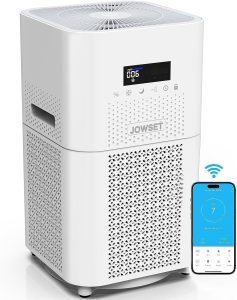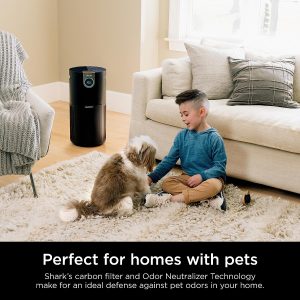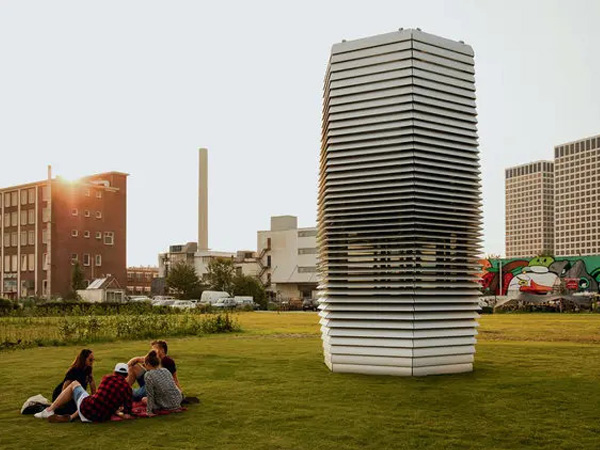This essay will examine how well home air purifiers work to reduce outdoor pollution. We’ll talk about how these things function and whether they can really filter out pollution from outside sources. We’ll also talk about the air purifiers’ limits and offer helpful advice for enhancing their efficiency. By the end, you’ll know more about whether indoor air quality can actually be improved by home air purifiers when it comes to external pollutants.
Understanding Home Air Purifiers
What are home air purifiers?
Devices called home air purifiers are made to take pollutants and toxins out of the air in your house. They are frequently utilized to enhance indoor air quality and make your home healthier for you and your family.
How do home air purifiers work?
Home air purifiers function by capturing and removing airborne contaminants using a variety of filtration methods. High Efficiency Particulate Air (HEPA) filtration is the filtering method most frequently employed in residential air purifiers. The removal of dust, pollen, pet dander, and mould spores as fine as 0.3 microns is made possible by this form of filtration.
Some home air purifiers use activated carbon filters in addition to HEPA filtration to capture gases, odors, and volatile organic compounds (VOCs). By removing chemical odors and unpleasant scents from the air, these filters help to improve the comfort and health of your house.
Benefits of using home air purifiers
The use of home air purifiers has a number of advantages. First of all, they raise indoor air quality by lowering air pollution levels. Asthma, allergy, and other respiratory disorders can all be helped by doing this.
In addition to removing undesirable odors from the air, home air purifiers also improve indoor comfort. Due to their ability to eliminate pet odors and dander, they can be especially helpful for households with pets.
Additionally, home air purifiers might aid in reducing the spread of airborne diseases. They can aid in limiting the spread of infections inside your home by eliminating viruses and germs from the air.

Outdoor Pollution and its Effects
What is outdoor pollution?
The term “outdoor pollution” describes the different pollutants that contaminate the air in an outside setting. These pollutants, which can be both man-made and natural, can be damaging to the environment and to human health.
Sources of outdoor pollution
Outdoor pollution comes from a variety of sources, such as car exhaust gases, industrial emissions, and the burning of fossil fuels for energy. Other sources include construction sites, farms, and natural occurrences like forest fires and volcanic eruptions.
Health effects of outdoor pollution
Various health consequences of outdoor pollution exposure are possible. High amounts of outdoor pollution can temporarily aggravate respiratory conditions like coughing, wheezing, and shortness of breath. Additionally, it might make pre-existing respiratory illnesses like bronchitis and asthma worse.
Lung cancer, heart disease, and stroke have all been linked to longer-term outdoor pollution exposure as major health concerns. Additionally, it may harm the immune system and raise the danger of respiratory infections.
Indoor Air Pollution and its Sources
What is indoor air pollution?
The term “indoor air pollution” describes the tainting of the air inside of structures, such as houses, workplaces, and educational institutions. Pollutants released from various sources inside the structure are frequently to blame.
Sources of indoor air pollution
Several factors contribute to indoor air pollution, including cigarette smoke, heating and cooking equipment, cleaning supplies, construction materials, and furniture. Pet dander, mold and mildew, and volatile organic compounds (VOCs) released from carpets, paint, and furniture are some more causes.
Effects of indoor air pollution on health
Various health impacts from exposure to indoor air pollution can be expected. It can worsen pre-existing respiratory disorders like asthma and allergies and induce respiratory symptoms including coughing, wheezing, and shortness of breath.
Long-term exposure to indoor air pollution has been associated with more significant health issues, such as lung cancer, cardiovascular disease, and respiratory infections. Additionally, it may impair cognitive performance and lower productivity and quality of life.
Can Home Air Purifiers Remove Outdoor Pollution?
Limitations of home air purifiers
Home air purifiers are good at getting rid of indoor air pollutants, but they can only do so much with outdoor pollution. This is due to the large variety of contaminants included in outdoor pollution, such as gases and particle matter, which can be challenging to entirely capture and eliminate.
Effectiveness of home air purifiers against outdoor pollution
Home air purifiers can assist to lower the levels of pollutants in your home’s air, even though they might not be able to totally eliminate pollution from the outside. They can contribute to bettering indoor air quality and fostering a healthier living environment by eliminating small particles and gases.
It is significant to remember that different elements, such as the size and kind of pollutants, the airflow in your home, and the performance of the filtering system employed in the air purifier, affect how successful home air purifiers are against external pollution.
Filtration technologies used in home air purifiers
Various filtration technologies are used by home air purifiers to catch and eliminate airborne contaminants. HEPA filtration, the most popular type of filtering, is very good at eliminating particles as small as 0.3 microns in size.
Some home air purifiers use activated carbon filters in addition to HEPA filtration to capture gases, odors, and VOCs. These filters aid in removing chemical odors and unpleasant vapors from the air, enhancing the quality of the air in your house as a whole.
Factors to Consider for Outdoor Pollution Control
Preventing outdoor pollution from entering homes
Preventing outdoor pollution from entering your home in the first place is one approach to lessen its effect on the quality of the air inside. This can be accomplished by employing air filters in your HVAC system, properly sealing windows and doors, and closing the windows during periods of heavy external pollution.
Improving indoor ventilation
Enhancing internal ventilation is another technique to lessen the effects of outdoor pollution. When the outside air quality is good, this can be accomplished by opening windows and doors, utilizing exhaust fans in the kitchen and bathroom, and installing mechanical ventilation systems.
Using air purifiers in conjunction with other methods
Home air purifiers can help to enhance indoor air quality even if they might not be able to entirely eliminate external pollution on their own. You can develop a more successful plan for lessening the effect of external pollution on your home by integrating air purifiers with appropriate ventilation and preventive measures.
Comparing Indoor and Outdoor Pollution
Differences between indoor and outdoor pollution
Pollutant kinds and sources vary between indoor and outdoor pollution. outer pollution is brought on by a variety of sources in the outer environment, whereas indoor pollution is mostly brought on by indoor activities and sources within buildings. Indoor pollution is frequently more intense and can include higher concentrations of some chemicals.
Understanding the extent of outdoor pollution indoors
Outdoor pollutants can nevertheless enter indoor spaces through a variety of paths, including open windows and doors, ventilation systems, and holes and fractures in the building envelope, despite the differences between indoor and outdoor pollution. This implies that outdoor pollution can have some impact on indoor air quality.
Benefits of Using Home Air Purifiers
Improving indoor air quality
By removing airborne contaminants, one of the main advantages of using home air purifiers is that they contribute to bettering indoor air quality. They can make your home healthier and more comfortable for you and your family by lowering the levels of air pollution.
Reducing the risks of indoor air pollution
Home air purifiers assist in lowering the risks connected to indoor air pollution in addition to enhancing indoor air quality. They can lessen the symptoms of respiratory diseases like allergies and asthma and lower the risk of respiratory infections by eliminating allergens, irritants, and other pollutants.
Creating a healthier living environment
Home air purifiers contribute to the creation of a better living environment for you and your family by enhancing indoor air quality and lowering the dangers of indoor air pollution. They can assist to improve sleep quality, reduce the symptoms of respiratory disorders, and increase general wellbeing.
Alternative Measures to Combat Outdoor Pollution
Reducing exposure to outdoor pollutants
Reducing your exposure to outside contaminants is one of the most efficient strategies to fight pollution in the environment. This can be achieved by staying indoors during times of intense outside pollution, using air filters in your HVAC system, and, if necessary, taking preventive steps like donning masks.
Community initiatives for reducing outdoor pollution
Community efforts are essential for lowering outdoor pollution. Communities may aid in enhancing outdoor air quality and preserving public health by supporting sustainable practices, fighting for clean energy sources, and putting in place emission-reduction laws.
Government policies and regulations
An important part of the fight against outdoor pollution is played by government policies and laws. Governments can assist in lowering the overall levels of air pollutants by establishing and enforcing limits on industrial emissions, car emissions, and other sources of outdoor pollution.

Conclusion
In conclusion, home air purifiers can assist to lower the levels of pollutants in your house’s air, even though they might not be able to entirely eliminate pollution from the outside. They can raise indoor air quality and produce a healthier living environment by catching and eliminating airborne particles and pollutants.
It is crucial to take into account additional steps to effectively address outside pollution, such as preventing outdoor pollution from entering houses, enhancing indoor ventilation, and employing air purifiers in conjunction with other strategies. You can reduce the effect of outdoor pollution on interior air quality and safeguard your family’s health by putting a comprehensive plan into action.

